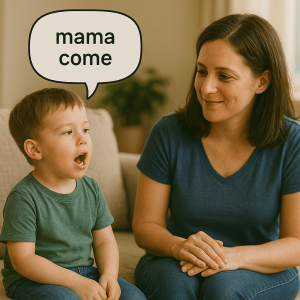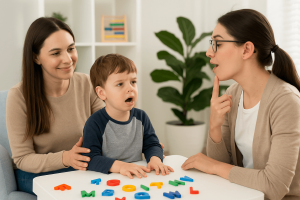9 Effective Exercises to Overcome Speech Delay in Toddlers
By Rajini D
Last Updated: February 23, 2024
Welcoming a new word from your toddler’s lips is like music to a parent’s ears. But what if those words are taking a bit longer to emerge? Speech delay in toddlers are not uncommon, and while they can be a source of concern for many parents, there’s a world of playful and effective ways to encourage your little one’s verbal skills.
The journey of language development is unique for every child, and sometimes, it needs a little nudge. That’s where fun and engaging exercises come into play. These are not just activities; they’re stepping stones to a world of words, sentences, and, eventually, endless stories and questions that every parent looks forward to.
Understanding Speech Delay in Toddlers
As we delve into the world of childhood development, one aspect that often catches the attention of parents and caregivers is speech delay in toddlers. It’s important to first understand what this means. Speech delay, simply put, is when a child’s language development lags behind what is typically expected for their age. It’s like a flower taking a little more time to bloom – each child has their own pace.
Now, why is early detection and intervention crucial? Identifying speech delay early on opens doors to effective strategies that can significantly help in catching up. It’s much like finding the right key to unlock a door – the sooner you find it, the quicker the door opens to progress and development.
For many parents, knowing that their child is experiencing a speech delay can be worrisome. But here’s a comforting thought: speech delays are more common than you might think, and they are very manageable. It’s a path many have walked before, and with the right guidance and support, strides can be made.
Also Read: Early Identification/ Warning Signs in child development.
Identifying Signs of Speech Delay in Toddlers
Recognizing the early signs of speech delay in toddlers is akin to a gardener noticing the subtle changes in a budding plant. It requires attention, patience, and an understanding of what to expect as your child grows. Just as each flower blooms in its own time, children reach speech milestones at their own pace.
Recognizing Signs of Speech Delay in Toddlers
| Age | Typical Speech Milestones | Potential Red Flags |
|---|---|---|
| 12 months | Babbles with different sounds, responds to their name, turns towards familiar voices | Limited babbling, no response to name, no interest in sounds or voices |
| 18 months | Uses single words (mama, dada, baba), understands simple instructions, points to objects | No single words by 18 months, difficulty understanding simple instructions, limited gestures |
| 2 years | Combines two words into phrases, asks simple questions (“What’s that?”), follows basic instructions | No word combinations by 2 years, difficulty expressing needs or wants, limited vocabulary |
| 3 years | Uses sentences of 3-4 words, tells short stories, and asks more complex questions (“Why is the sky blue?”) | Difficulty forming sentences, limited understanding of complex instructions, frustration with communication |
Explore our article on Parenting Styles | Child Psychology
Understanding Typical Speech Milestones
From the first coos and babbles, the journey of language development is a fascinating one. By around 12 months, many toddlers start to utter their first meaningful words. As they approach 18 months, combining words and forming simple phrases becomes more common. By the age of two, a child’s vocabulary usually blossoms to include a variety of words used to express their needs and describe their world.
Read more about Is Your Toddler Talking Yet? Speech Development at 15 Months
Natural Variations vs. Potential Speech Delays
It’s essential to appreciate the natural variations in how children develop their speech and language skills. Some may sprint ahead, while others take a more leisurely stroll on this path. However, if you notice your child isn’t meeting typical milestones – such as not using simple words by 18 months or struggling to combine words into phrases by age two – it might be an indication of a speech delay.
Enhance your approach with insights from Communication Difficulties in Children.
Trusting Your Instincts
As a parent, you know your child best. Trust your instincts. If something feels off, or if your child seems to be struggling more than their peers, it’s worth exploring further. Observe how your child communicates with you and others. Are they using gestures, making eye contact, and trying to form words? Or do they seem frustrated or indifferent to communication?
Next Steps
If you suspect a speech delay, the first step is not to panic. Remember, identifying a delay early can lead to more effective interventions. Reach out to your pediatrician or a speech-language therapist for a professional evaluation. They can provide you with guidance and support tailored to your child’s needs.
In the upcoming sections, we’ll delve into practical and enjoyable exercises that can support your child’s speech development journey. These activities are designed to be integrated into your daily routine, making learning fun and effective for your little one.
Also Read: The Speech Chain: Understanding How We Communicate
9 Fun and Effective Exercises
Engaging your toddler in activities that boost speech and language skills can be both enjoyable and immensely beneficial. Here are nine fun exercises that not only encourage speech development but also strengthen your bond with your child through playful interaction.
Know more about on Speech Delays in Premature Infants: What Parents Need to Know
1. Interactive Storytelling:
Dive into the world of picture books with your toddler. As you read, pause and encourage them to name objects and characters. Ask questions like, “What’s this?” while pointing to an object. This not only builds vocabulary but also fosters a love for stories.
Enhance storytelling with our guide on Speech and Language Milestones 3 to 4 Years, to understand age-appropriate language skills.
2. Sing-Along Sessions:
Music is a fantastic way to enhance verbal skills. Sing nursery rhymes and simple songs together. The rhythm and repetition of songs make it easier for toddlers to remember words and phrases.
3. ‘Simon Says’ with Words:
Add a verbal twist to the classic game of Simon Says. For example, say, “Simon says, touch your nose,” and perform the action. This encourages your child to both understand and use language in a fun, interactive setting.
Learn more about engaging your child through play in Communication Difficulties in Children
4. Sound Imitation Games:
Play a game where you mimic animal sounds or environmental noises and have your child guess what you’re imitating. Then, switch roles and let them make the sounds. This is a delightful way to practice speech sounds.
5. Picture Flashcards Fun:
Flashcards with pictures of everyday objects can be a playful tool for building vocabulary. Show a card and say the word, then ask your child to repeat it. Make it a game by mixing up the cards and finding matches.
6. Daily Routine Narration:
Narrate your daily activities to your child. For example, when making breakfast, you might say, “I’m pouring the milk. Now I’m slicing the banana.” This continuous exposure to language helps with understanding and use.
7. Bubble Talk:
Blowing bubbles can be a delightful way to encourage speech. Each time a bubble pops, encourage your child to say “pop” or ask for ‘more’ bubbles. This simple activity can encourage the use of words in a natural context.
See how simple activities can aid speech in Does Speech Therapy Work for Toddlers?
8. Treasure Hunt with Words:
Organize a simple treasure hunt where your toddler has to name objects they find. Hide toys around the house and give clues. When they find an object, encourage them to say its name.
9. Role-Playing Games:
Engage in role-playing scenarios that require verbal interaction. Pretend play, like being in a grocery store or a doctor’s office, can encourage the use of language in a fun, imaginative way.
Each of these exercises is designed to make learning to speak fun and natural for your toddler. Remember, the key is consistency and making these activities a regular part of your routine. For more insights on enhancing your child’s development, visit Wellness Hub’s collection of resources here.
Also Read: Speech and Language Milestones – 1 to 2 years
9 Fun and Effective Exercises for Speech Development
| Exercise | Description | Benefits |
|---|---|---|
| Interactive Storytelling | Read picture books together, pause and ask questions, and encourage the child to name objects and characters. | Builds vocabulary, develops listening skills, fosters imagination |
| Sing-Along Sessions | Sing nursery rhymes and simple songs together, clap along, add gestures | Enhances rhythm and pronunciation, improves memory, and creates a bonding experience |
| Simon Says with Words | Play “Simon Says” with verbal instructions like, “Simon says, touch your nose” or “Simon says, jump up high.” | Promotes understanding and following instructions, and encourages motor planning with verbal cues. |
| Sound Imitation Games | Make animal sounds or environmental noises and have your child guess, then switch roles. | Pretend to play together in scenarios requiring dialogue (doctor’s office, grocery store) |
| Picture Flashcard Fun | Show flashcards with pictures of everyday objects and say the word, encourage child to repeat | Expands vocabulary, strengthens word-object association, makes learning interactive |
| Daily Routine Narration | Describe what you’re doing as you go about your day (cooking, cleaning, shopping) | Exposes a child to language in context, encourages understanding of actions and objects, and creates opportunities for imitation. |
| Bubble Talk | Blow bubbles and encourage your child to say “pop” each time one bursts | Practices breath control, strengthens vocalization, adds excitement to communication |
| Treasure Hunt with Words | Hide toys around the house and give clues using words, have your child name the object when they find it | Motivates listening and comprehension, builds vocabulary in a playful way, develops problem-solving skills |
| Role-Playing Games | Pretend play together in scenarios requiring dialogue (doctor’s office, grocery store) | Encourages social interaction and communication, expands vocabulary with role-specific words, builds confidence in using language |
Explore our article on Unlocking Speech & Language: Key Milestones for 2-3 Year Olds (with Tips!)
Beyond Exercises – Everyday Strategies
While specific exercises are fantastic for encouraging speech development in toddlers, integrating speech-enhancing strategies into your daily routine can be equally effective. These everyday interactions provide natural opportunities for your child to develop their language skills in a comfortable and familiar environment.
Integrating Speech Development into Daily Routines
- Narrate Your Day: As you go about your daily activities, describe what you’re doing to your child. Whether you’re cooking, cleaning, or shopping, use simple language to explain your actions. This constant stream of language immersion helps your child to understand and eventually mimic words and phrases.
- Encourage ‘Helping’ in Tasks: Involve your child in simple tasks like sorting laundry or setting the table. As they help, talk about what you’re doing together. This not only builds vocabulary but also strengthens your bond.
- Mealtime Conversations: Use meal times to talk about the foods you’re eating, their colors, textures, and tastes. Encourage your child to express their preferences and dislikes.
The Importance of Repetition and Patience
Patience is key in the journey of speech development. Children often need to hear words and phrases several times before they start using them. Repetition reinforces learning, so don’t shy away from repeating words, phrases, or songs. Celebrate small progress – every new word or sound is a step forward.
Encouraging Non-Verbal Communication
Non-verbal communication, such as gestures, facial expressions, and body language, is an important precursor to verbal communication. Encourage your child to express themselves using gestures like nodding, shaking their head, or pointing. This not only enhances communication but also gives them tools to express themselves before their verbal skills are fully developed.
When to Seek Professional Help
As you journey with your child through their speech and language development, it’s important to recognize the signs that might indicate the need for professional help. While every child’s developmental path is unique, there are certain milestones and behaviors to be mindful of, which, if not met, may suggest consulting a speech-language therapist could be beneficial.
If considering a professional intervention, learn more from Speech Therapy for Autism.
Identifying the Need for Professional Intervention
- Significant Delays in Speech Milestones: If your child is significantly behind in speech milestones compared to their peers – for instance, not using any words by 18 months or not combining two words by age two – it may be time to seek professional advice.
- Difficulty Understanding Simple Instructions: If you notice that your child has trouble understanding and following simple instructions by the age of two, this could be a sign of a speech or language disorder.
- Limited Social Interaction: If your child shows little interest in communicating with others or struggles to initiate or respond in social interactions, professional guidance can be very helpful.
- Frustration or Behavioral Issues: Sometimes, children with speech delays may exhibit frustration or behavioral issues due to their difficulty in expressing themselves. This is another indicator that seeking help might be beneficial.
Also Read: Understanding Language Disorders: Causes and Characteristics
Conclusion
It’s clear that addressing speech delays in toddlers is a journey of patience, understanding, and creativity. The key lies in embracing fun and engaging exercises – from interactive storytelling to playful sound imitation games. These activities not only enhance speech development but also strengthen the bond between you and your child. Integrating speech enhancement into daily routines, acknowledging the value of repetition, and recognizing when to seek professional help are crucial steps in supporting your child’s communication journey.
In this process, your role as a parent or caregiver is invaluable. Your dedication and involvement are the pillars that support and guide your child’s development. Remember, each small step forward is a significant leap in your child’s ability to express themselves. At Wellness Hub, we understand the intricacies of this journey. Our platform offers a wealth of resources, expert advice, and a supportive community to guide you through each stage of your child’s speech development.
Frequently Asked Questions
1. What Are the Early Signs of Speech Delay in Toddlers?
Early signs include not babbling by 12 months, not speaking single words by 16 months, and not combining two words by 2 years. Each child develops differently, but these are general milestones to watch for.
2. How Can Fun Exercises Help Toddlers Overcome Speech Delays?
Fun exercises like interactive storytelling and sound imitation games engage toddlers in a relaxed and enjoyable way, encouraging them to practice speech and language skills. These activities enhance learning by keeping them interested and motivated.
3. When Should Parents Consider Professional Help for Speech Delay?
If a child significantly lags behind typical speech milestones, struggles to understand simple instructions, or shows frustration in communication, it may be time to seek a speech-language pathologist’s evaluation.
4. What Role Do Parents Play in Addressing Speech Delays?
Parents play a crucial role in their child’s speech development. Consistent engagement in speech-enhancing activities, patience with the child’s pace, and creating a supportive environment are key to fostering speech and language skills.
5. Can Speech Delay Indicate Other Developmental Issues?
While speech delays are common and often not a cause for concern, they can sometimes indicate broader developmental issues. It’s important to monitor a child’s overall development and consult with healthcare professionals if there are concerns.
6. Are There Everyday Activities That Can Improve Speech in Toddlers?
Yes, everyday activities like narrating routine tasks, involving the child in simple chores, and having regular conversations can significantly improve speech development by providing natural and consistent language exposure.
7. How Does Speech Therapy Benefit Toddlers with Speech Delays?
Speech therapy offers tailored strategies and exercises to improve a child’s speech and language abilities. It helps in articulation, vocabulary building, understanding language, and social communication skills.
8. How Can I Differentiate Between a Speech Delay and a Typical Variation in Development?
If your child consistently falls behind on key milestones, such as using simple phrases or understanding basic instructions, it might indicate a speech delay rather than a typical developmental variation.
9. Are There Specific Toys or Games Recommended for Toddlers with Speech Delays?
Yes, certain toys and games can aid speech development. Toys that encourage imitation and turn-taking, like simple board games, interactive electronic toys that prompt verbal responses, and picture books for storytelling, are beneficial. The key is to choose toys that stimulate communication and interaction.
10. What Resources Does Wellness Hub Offer for Speech Delay in Toddlers?
Wellness Hub provides a range of resources, including expert articles, interactive tools, and access to professionals specializing in child development and speech therapy, helping parents navigate their child’s speech delay journey.
About the Author:
Rajini Darugupally
M.Sc., Speech-Language Pathologist (9+ years of experience)
Rajini is a passionate and dedicated Speech-Language Pathologist with over 9+ years of experience, specializing in both developmental speech and language disorders in children and rehabilitation in adults. Driven by a desire to empower each individual to find their voice, Rajini brings a wealth of experience and a warm, genuine approach to therapy.
Currently, at Wellness Hub, she thrives in a team environment that values innovation, compassion, and achieving results for their clients.
Connect with Rajini to learn more about how she can help you or your loved one find their voice.
Book your Free Consultation Today
Parent/Caregiver Info:
Client’s Details:
* Error Message








